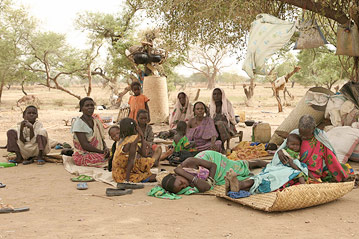UNHCR concerned about deteriorating situation in Chad
UNHCR concerned about deteriorating situation in Chad

GENEVA, November 14 (UNHCR) - With new attacks reported daily in south-eastern Chad, UNHCR said Tuesday it was extremely worried that an already volatile situation is continuing to deteriorate. The refugee agency's statement came a day after the Chad government declared a state of emergency and said it was devising a strategy to deal with the situation.
"UNHCR remains concerned by the difficult humanitarian situation and the difficulties we're facing in properly assisting local residents, internally displaced people and refugees," the refugee agency's chief spokesman, Ron Redmond, said in Geneva on Tuesday.
The violence, which has left more than 220 dead, appears to mirror that of the neighbouring Darfur region of Sudan and UNHCR said it feared the inter-communal hostilities were spiralling out of control and could threaten the entire south-eastern region of Chad.
Since November 7, hundreds of newly displaced Chadians have converged on a site for internally displaced people (IDPs) in Habile, 45 kilometres south-east of the town of Goz Beida. Others are fleeing elsewhere near Goz Beida, and UNHCR is currently conducting a census to determine numbers. In all, there are now some 68,000 people who have been displaced within eastern Chad in a series of attacks over the past year.
UNHCR's Redmond reiterated a call for the international community to quickly mobilise a multi-dimensional presence in Chad to help protect hundreds of thousands of Chadian civilians and Sudanese refugees, as well as aid workers trying to help them. In August, UN Security Council Resolution 1706 called for the deployment of a multi-dimensional United Nations presence to Chad and the neighbouring Central African Republic.
Since November 4, at least 20 villages have been attacked in the region south of Goz Beida. The region is very insecure. A UNHCR-led inter-agency mission to assess the burnt down village of Louboutigue on Monday had to flee when gunfire, believed to be warning shots, were fired from nearby fields by unseen gunmen. No one was injured, but it was just a small sampling of the terror that tens of thousands of Chadians are now experiencing daily in the south-east.
One of the UNHCR team members said he had "witnessed sights I never could have imagined - a young father with his eyes gouged out, elderly women with third-degree burns on their backs and arms caused by collapsed thatched huts set aflame, miles and miles of brushland torched. Communities that had long lived in harmony have turned on each other."
Accounts from displaced Chadians bear a striking similarity - the assailants are almost always identified as being of Arab ethnicity, often known personally by victims as neighbours with whom they had lived for generations. They are often well armed, particularly with Kalashnikov assault rifles; on horseback, camel or in trucks; sometimes in military attire, sometimes in civilian attire.
UNHCR field staff said that in the village of Bandicao, residents have warned humanitarian agencies that it is not safe to send ambulances to evacuate the wounded because gunmen were lying in wait. Government forces were dispatched again on Monday to Kerfi, about 45 km south of Goz Beida, and to Bandicao - about another 35 km south - to evacuate the wounded to the hospital in Goz Beida.
From the region north-east of Goz Beida, UNHCR has also received reports of attacks in the Koloye area. The attacks, last Tuesday and again on Saturday, reportedly left several dead and wounded.
Some people fearing attacks had time to gather some belongings for the long journey by foot or donkey to the outskirts of Goz Beida town. Others found themselves under attack before they had time to collect anything, and have arrived with little more than the tattered clothes they were wearing. Some IDPs are taking the risk of making day trips to their burned-out villages to collect any belongings that can be salvaged from the ashes.
A man from Wadi Habile village, 15 kms east of Goz Beida, said unknown Arabs with horses and camels attacked the village on Friday, burning dwellings, opening fire on villagers and stealing their livestock and crops. "Our people have fled in various directions," he added.
At the Goz Beida hospital, capacities have been stretched in recent days with the arrival of about 70 wounded. The hospital does not have enough beds and many patients are recuperating from serious wounds on mats under trees outside. To help ease the strain on the hospital, UNHCR has provided 10 large tents to house patients along with sleeping mats. Other agencies also provided assistance, including bandages and medicine. At the Habile IDP site, UNICEF and its partners have been installing additional water points and latrines to accommodate the most recent arrivals.








